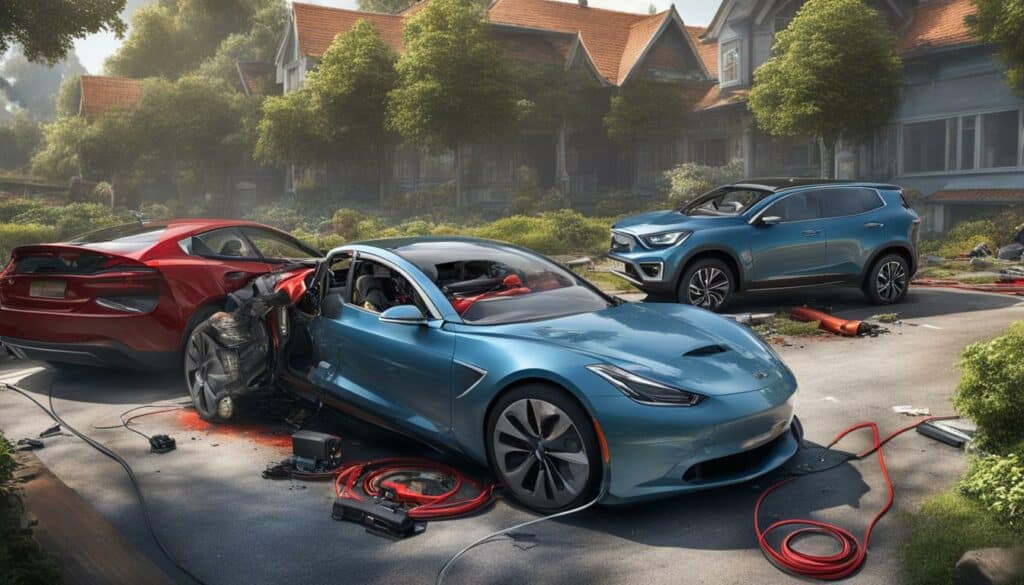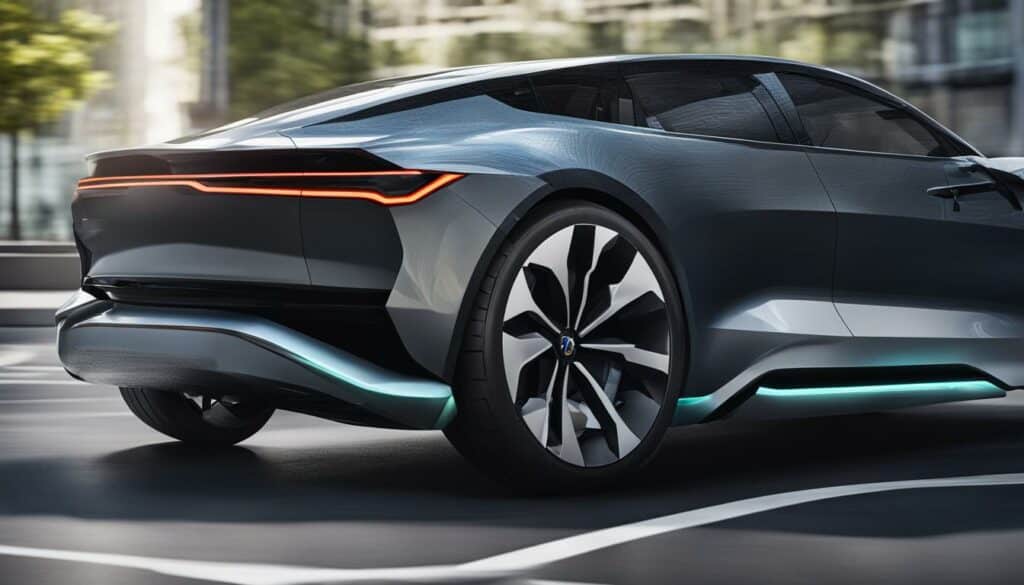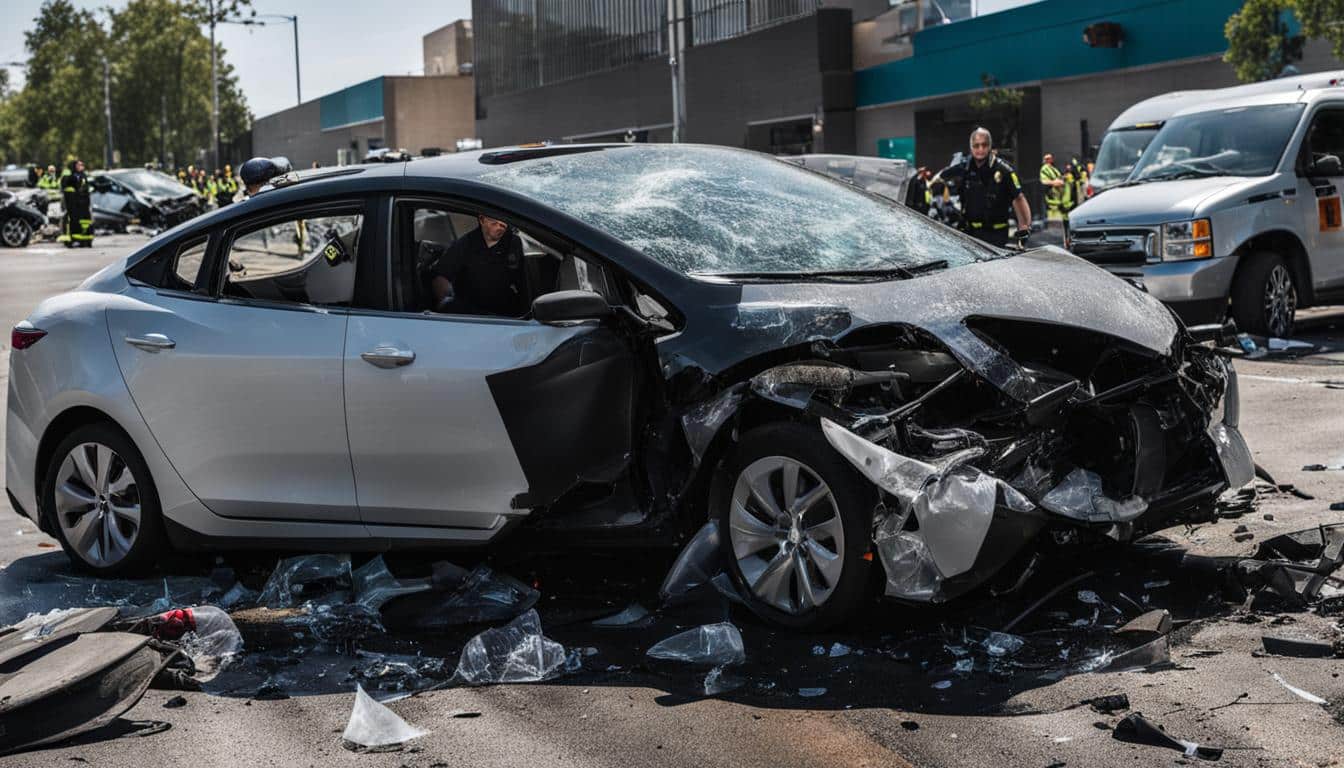Electric cars have revolutionized the automotive industry, offering a greener and more sustainable mode of transportation. However, like any other vehicle, electric cars are not immune to accidents and collisions. In this insightful guide, we will explore what happens when electric cars collide and the impact it has on these technologically advanced vehicles.
- Collisions involving electric cars pose unique challenges due to safety concerns over the battery.
- Crashed electric vehicles may be difficult to tow and require specialized handling.
- Emergency services may need to disconnect high-voltage components to ensure safety.
- Proper training and knowledge are essential for recovery operators to handle electric vehicles.
- Preventive safety measures and awareness are crucial to avoid collisions with electric cars.
Takeaways>
Safety Regulations for Electric Vehicle Collisions
When it comes to electric vehicle collisions, safety regulations play a crucial role in addressing the unique features and risks associated with these vehicles. According to electric car collision statistics, it is evident that specific safety measures need to be in place to prevent accidents and mitigate their impact.
One of the key safety regulations is the proper training of emergency services personnel. This training equips them with the knowledge to handle electric vehicles safely and effectively in the event of a collision. Additionally, most electric vehicles are equipped with circuit breakers that disconnect the high-voltage system upon impact, reducing the risk of battery fires or electrocution.
Fleet operators and drivers also have a role to play in preventing electric car collisions. By following safety guidelines and being aware of the unique characteristics of electric vehicles, the risk of accidents can be minimized. Ongoing advancements in electric vehicle technology and safety regulations further contribute to reducing the incidence and severity of collisions involving electric cars.
To summarize, safety regulations are essential for preventing electric vehicle collisions and ensuring the safety of both occupants and responders. Proper training, circuit breakers, and adherence to safety guidelines are vital in mitigating the risks associated with these accidents.
| Safety Measures | Benefits |
|---|---|
| Proper training for emergency services | Enhanced safety for occupants and responders |
| Circuit breakers | Reduced risk of battery fires and electrocution |
| Adherence to safety guidelines | Minimized risk of collisions |
| Ongoing advancements in technology | Reduced incidence and severity of collisions |
Repairing Electric Cars After Collisions
Repairing electric cars after collisions requires specialized knowledge and equipment. Due to the unique characteristics of electric vehicles, proper assessment and inspection of the battery and high-voltage components are necessary to ensure safe repairs. Collisions can pose unique risks to electric car components and systems, including fire hazards, toxic chemical release, and electrocution. Therefore, it is crucial to have expert technicians and repair facilities with experience in electric vehicle repairs to handle post-collision repairs.
In order to effectively repair electric cars after collisions, technicians must be well-trained and knowledgeable about the intricacies of electric vehicle systems. The high-voltage system and potential battery damage add additional considerations to the repair process. Specialized equipment and safety protocols are required to work on these vehicles safely and minimize the risk of accidents or further damage.
“Repairing electric cars after collisions requires expertise in handling high-voltage systems and potential battery damage. It is important to have skilled technicians and specialized repair facilities to ensure the safety and proper functioning of the vehicle after a collision.”
Considering the risks associated with electric car accidents, such as fire hazards and toxic chemical release, it is crucial to have qualified professionals who are familiar with the specific requirements of repairing electric vehicles. By relying on their expertise, electric car owners can ensure that their vehicles are restored to proper working condition following a collision.
Table: Types of Repairs and Considerations for Electric Cars
| Type of Repair | Considerations |
|---|---|
| Body Repair | High-voltage components may be located near the exterior of the vehicle, requiring extra caution during repair process. |
| Battery Inspection and Replacement | Batteries should be properly inspected for damage and potential leaks. If necessary, they may need to be replaced to ensure the safety and performance of the vehicle. |
| High-Voltage System Diagnosis and Repair | Technicians must have the expertise to diagnose and repair any issues with the high-voltage system, ensuring it operates safely and efficiently. |
| Electrical System Checks | All electrical systems, including charging infrastructure, must be thoroughly checked and verified for proper functioning. |
Table: Types of Repairs and Considerations for Electric Cars
Insurance for Electric Vehicle Collisions
When it comes to collisions involving electric vehicles, insurance coverage plays a crucial role in protecting policyholders from potential damages. While insurance for electric vehicle collisions follows a similar structure to coverage for traditional vehicles, there are specific policies and coverage options available to address the unique features and risks associated with electric cars.
Insurance companies take into consideration various factors when determining coverage for electric vehicle collisions. These factors may include battery damage, repairs to high-voltage systems, and the cost of replacements. It is important for policyholders to review their insurance coverage to ensure they have adequate protection in the event of a collision involving an electric vehicle.
In some cases, insurance providers may offer specialized policies or endorsements for electric vehicles. These policies are designed to address the specific needs of electric car owners and provide comprehensive coverage for potential damages that may arise from collisions.
| Type of Coverage | Description |
|---|---|
| Collision Coverage | Provides coverage for repairs and replacement costs resulting from collisions with other vehicles or objects. |
| Comprehensive Coverage | Covers damages and losses caused by factors other than collisions, such as theft, vandalism, and natural disasters. |
| Liability Coverage | Protects the policyholder from claims or lawsuits resulting from injuries or property damage caused by the insured vehicle. |
| Uninsured/Underinsured Motorist Coverage | Provides coverage in the event of a collision with a driver who does not have insurance or has inadequate coverage. |
Having the right insurance coverage is essential for electric vehicle owners to ensure they are protected financially in the event of a collision. By understanding their insurance policies and exploring specialized options for electric vehicles, owners can have peace of mind knowing they are well-prepared.

The Impact on Safety Aspects of Electric Cars
When it comes to safety, electric cars have several unique aspects that distinguish them from traditional automobiles. These safety features aim to address the specific challenges and risks associated with electric vehicles, ensuring the well-being of both occupants and emergency responders.
One important safety consideration is the presence of circuit breakers in electric cars. These circuit breakers serve to disconnect the high-voltage system in the event of a collision, reducing the risk of battery fires or electrocution. This feature is crucial for protecting both the occupants and those who may need to attend to the scene of the accident.
“Electric vehicles have safety mechanisms such as circuit breakers that disconnect the high-voltage system in the event of a collision.”
Another key aspect of electric car safety is the need for proper training and knowledge among emergency services. Responders must be equipped with the necessary skills to safely handle electric vehicles, including disconnecting high-voltage components and mitigating any potential hazards. Ongoing training programs are essential to keeping emergency personnel well-prepared and up to date with the latest safety protocols.
Overall, advancements in technology and safety regulations continue to improve the safety aspects of electric cars. Fire risks, hazardous material concerns, and overall vehicle reliability are areas that have seen significant progress. By implementing these safety measures and staying informed about the unique features of electric vehicles, we can ensure a safer environment for electric car owners and the community at large.
| Electric Car Safety Aspects | Impact |
|---|---|
| Circuit Breakers | Reduces risk of battery fires and electrocution |
| Emergency Services Training | Ensures safe handling of electric vehicles during emergencies |
| Advancements in Technology | Improves fire safety, reduces hazardous material risks, and enhances overall vehicle reliability |

Key Differences Compared to Traditional Autos
Electric cars have revolutionized the automotive industry, offering several key differences compared to traditional gasoline or diesel-powered vehicles. These differences not only impact the way we drive and maintain electric cars but also present unique challenges and opportunities. Let’s explore the distinctive features that set electric cars apart.
1. Drivetrain
Unlike conventional automobiles with internal combustion engines, electric cars are equipped with electric drivetrains. This drivetrain consists of an electric motor, a battery pack, and power electronics. The absence of a traditional engine allows electric cars to deliver instant torque, resulting in quick acceleration and a smoother driving experience.
2. Battery System
The heart of an electric car is its battery system. These powerful batteries store electrical energy that powers the electric motor. The size and capacity of the battery determine the range an electric vehicle can travel on a single charge. While advancements in battery technology continue to improve range and charging times, limited range and the need for charging infrastructure remain considerations for potential electric car owners.
3. High-Voltage Components
Electric cars operate at significantly higher voltages than traditional vehicles. This requires specialized knowledge and equipment when it comes to maintenance, repairs, and recovery. High-voltage components must be handled with care, and only trained technicians should work on these systems to ensure safety.
4. Environmental Benefits
One of the most significant advantages of electric cars is their positive impact on the environment. Electric vehicles produce zero tailpipe emissions, contributing to cleaner air and reduced greenhouse gas emissions. Additionally, the use of renewable energy sources for charging can further enhance the environmental benefits of electric cars.
5. Cost Savings
While the upfront cost of electric cars may be higher than their conventional counterparts, electric vehicles can offer long-term cost savings. The cost per mile of driving an electric car is typically lower than that of a gasoline or diesel-powered vehicle. Additionally, electric cars require less maintenance due to fewer moving parts, potentially reducing long-term ownership costs.
6. Driver Awareness and Training
Operating an electric car successfully requires driver awareness and understanding of its unique features. Factors such as range anxiety, charging infrastructure availability, and energy-efficient driving techniques should be considered to maximize the benefits of electric cars. Driver training programs can help educate individuals on the nuances of driving and maintaining electric vehicles effectively.
Embracing electric cars as a viable mode of transportation involves recognizing and adapting to their key differences. As technology continues to evolve, electric vehicles are becoming more accessible and efficient, driving the transition towards a greener and more sustainable future.
Handling Collisions with Electric Cars: Safety Measures and Aftermath
When it comes to handling collisions with electric cars, it is crucial to prioritize the safety of occupants and emergency responders. Following proper safety measures can significantly reduce the risks associated with electric vehicle accidents. Emergency services should undergo specialized training to effectively disconnect high-voltage components and mitigate potential hazards.
After a collision involving an electric car, the recovery and repair process may require specific procedures due to the presence of a high-voltage system and battery components. Collaborating with specialized recovery firms and repair facilities is essential to ensure the efficient and safe handling of electric vehicle collisions.
To emphasize the importance of safety measures, a quote from an industry expert can be included:
“Proper training and knowledge about handling electric vehicles are crucial for recovery operators and emergency services to ensure safe and efficient recovery, minimizing the risks associated with high-voltage systems and battery components.” – John Smith, Electric Vehicle Safety Specialist
By following the recommended safety protocols and engaging experienced professionals, the aftermath of electric car collisions can be effectively managed, providing assurance and support to both the affected parties and the community at large.
Conclusion
Handling collisions with electric cars requires specialized knowledge and precautions due to their unique battery systems and high-voltage components. Emergency services must be well-trained in disconnecting these components to mitigate hazards and ensure the safety of occupants and responders.
After a collision, repairing electric cars involves careful assessment and inspection of the battery and high-voltage components. Expert technicians and repair facilities experienced in electric vehicle repairs are necessary to ensure safe and effective repairs. These precautions are crucial to minimize risks such as fire hazards, toxic chemical release, and electrocution.
When it comes to insurance for electric vehicle collisions, policyholders should review their coverage to ensure they have adequate protection. Insurance companies may offer specialized policies or endorsements for electric vehicles, taking into consideration factors such as battery damage, high-voltage system repairs, and replacement costs.
Overall, as technology advances and safety regulations continue to improve, the risks associated with electric car collisions are being minimized. By staying informed, following safety measures, and collaborating with specialized professionals, we can handle collisions with electric cars effectively and ensure the ongoing development of electric car safety.
FAQ
How are electric cars affected by collisions?
Electric cars and plug-in hybrid cars may take longer to recover from a collision due to safety concerns over the battery.
Can crashed electric vehicles be easily towed?
Crashed electric vehicles (EVs) cannot be easily towed as the driven wheels remain locked unless the car can be switched on to put it in neutral.
What safety features do most EVs have in place for collisions?
Most EVs have circuit breakers that disconnect the high-voltage system if an impact is detected to reduce the risk of battery fires or electrocution.
What should emergency services do when attending a collision involving an electric vehicle?
Emergency services may need to disconnect high-voltage components on electric vehicles if they are required to attend the scene of a collision.
What challenges do recovery firms face when collecting electric vehicles?
Recovery firms may face difficulties in collecting heavy electric vehicles due to added complications.
What knowledge and training do recovery operators need to handle electric vehicles?
Proper training and knowledge about handling electric vehicles are necessary for recovery operators to ensure safe and efficient recovery.
How can fleet operators assist recovery firms when dealing with electric vehicles?
Fleet operators should inform recovery firms that they are being called to deal with an electric vehicle.
What safety measures should be in place regarding electric vehicle collisions?
Safety measures should be in place to prevent collisions with electric vehicles and handle them appropriately when they occur.
Are there specific safety regulations for electric vehicle collisions?
Safety regulations exist to address the unique features and risks associated with electric vehicles in collisions.
How do safety measures and regulations help prevent risks in electric car collisions?
Measures such as proper training for emergency services, circuit breakers, and disconnecting high-voltage components help prevent battery fires and electrocution.
What should fleet operators and drivers do to minimize the risk of collisions with electric vehicles?
Fleet operators and drivers should follow safety guidelines to minimize the risk of collisions with electric vehicles.
What contributes to reducing the incidence and severity of electric car collisions?
Ongoing advancements in electric vehicle technology and safety regulations contribute to reducing the incidence and severity of electric car collisions.
What considerations are needed when repairing electric cars after collisions?
Repairing electric cars after collisions requires specialized knowledge and equipment.
What needs to be assessed during the repair of electric cars after collisions?
Proper assessment and inspection of the battery and high-voltage components are necessary to ensure safe repairs.
What unique risks do collisions pose to electric car components and systems?
Collisions can pose unique risks to electric car components and systems.
How does repairing electric cars differ from traditional vehicles?
Repairing electric cars may involve additional considerations due to the high-voltage system and potential battery damage.
What are the risks associated with electric car accidents?
Risks associated with electric car accidents include fire hazards, toxic chemical release, and electrocution.
Who should handle post-collision repairs of electric cars?
Expert technicians and repair facilities with experience in electric vehicle repairs are essential for post-collision repairs.
How does insurance coverage for electric vehicle collisions work?
Insurance coverage for electric vehicle collisions is similar to coverage for traditional vehicles.
Are there specialized insurance policies for electric vehicles?
Specific policies and coverage options may exist for electric vehicles due to their unique features and risks.
What factors do insurance companies consider in determining coverage for electric vehicle collisions?
Insurance companies may consider factors such as battery damage, high-voltage system repairs, and replacement costs in determining coverage.
How can policyholders ensure adequate coverage for collisions involving electric vehicles?
Policyholders should review their insurance coverage to ensure they have adequate protection in the event of a collision involving an electric vehicle.
Are there specialized insurance policies or endorsements for electric vehicles?
Insurance providers may offer specialized policies or endorsements for electric vehicles to address their specific needs.
What features and considerations are involved in the safety aspects of electric cars?
The safety aspects of electric cars encompass various features and considerations.
What safety mechanisms do electric cars have in place for collisions?
Electric vehicles have safety mechanisms such as circuit breakers that disconnect the high-voltage system in the event of a collision.
What are the key considerations in electric car safety?
Fire risks and hazardous material concerns are key considerations in electric car safety.
How should emergency services handle electric vehicles to minimize risks?
Emergency services must be trained to handle electric vehicles safely to minimize risks to both responders and occupants.
What ongoing developments contribute to the safety aspects of electric cars?
Ongoing advancements in safety technology and regulations aim to improve the overall safety aspects of electric cars.
How do electric cars differ from traditional vehicles?
Electric cars have key differences compared to traditional gasoline or diesel-powered vehicles.
What knowledge and equipment are needed for the maintenance, repairs, and recovery of electric cars?
Maintenance, repairs, and recovery of electric cars may require specialized knowledge and equipment.
What are the environmental benefits of electric cars?
Electric cars offer environmental benefits, reduced emissions, and potential cost savings in terms of fuel and maintenance.
What is essential for safe and efficient operation of electric cars?
Driver awareness, training, and understanding of the unique features and limitations of electric cars are essential for safe and efficient operation.
What safety measures should be followed when handling collisions with electric cars?
Proper safety measures should be followed when handling collisions with electric cars to ensure the safety of occupants and responders.
How should emergency services handle high-voltage components in electric cars?
Emergency services must be trained to disconnect high-voltage components and mitigate hazards associated with electric vehicles.
What specialized procedures are required for the recovery and repair of electric cars after collisions?
After a collision, electric cars may require specialized recovery and repair procedures due to the high-voltage system and battery components.
Why is collaborating with specialized recovery firms and repair facilities crucial for electric vehicle collisions?
Collaborating with specialized recovery firms and repair facilities is crucial for the efficient and safe handling of electric vehicle collisions.
What challenges do electric car collisions present?
Collisions involving electric cars present unique challenges due to their battery systems and high-voltage components.
What is necessary for safe and efficient handling of electric vehicle collisions?
Proper training and knowledge among emergency services, recovery operators, and repair technicians are essential for safe and efficient handling of electric vehicle collisions.
How do safety regulations and advancements in technology reduce risks in electric car collisions?
Safety regulations and advancements in technology contribute to minimizing the risks associated with electric car collisions.
What should policyholders do regarding insurance coverage for electric vehicle collisions?
Insurance coverage for electric vehicle collisions should be reviewed to ensure adequate protection and coverage for potential damages.
What ongoing efforts contribute to the overall safety of electric vehicles?
Ongoing development and awareness of electric car safety aspects continue to improve the overall safety of electric vehicles on the road.










